Integrating e-commerce platforms with accounting software is rarely smooth. Sellers often expect automation to remove the stress of bookkeeping, but the reality is different.
Getting started means manually mapping tax codes, expense categories, and sales channels. One wrong mapping can throw off your entire reconciliation. If you’re selling across countries brings VAT and OSS rules into play.
Combined fees, refunds, and discounts often don’t match up cleanly with payouts. That leads to duplicate lines, rounding issues, or unreconciled deposits.
As you expand across channels, each new integration can mean another subscription or added setup fees, turning “automation” into an expensive burden.
These frustrations are why the choice of integration tool matters.
In this comparison, we’ll break down A2X integrations clearly so you can decide if it’s the best match for your business right now.
Key Takeaways from this Post
A2X accurately summarizes marketplace payouts but requires manual setup: It automates sales, refunds, fees, and taxes across Amazon, Shopify, Etsy, eBay, and Walmart, but users still need to configure tax codes and account mappings, especially for VAT or multi-channel sellers.
Pricing can scale quickly for multi-channel businesses: A2X charges per channel, so adding extra stores or marketplaces means paying for multiple plans. Multi-channel tiers cap at five channels, which limits flexibility as sellers grow.
Link My Books offers similar automation with simpler setup and lower costs: Built for UK/EU VAT compliance, Link My Books applies tax rules automatically, supports more channels under one plan, and typically costs 30–40% less than A2X for multi-channel sellers.







Overview of A2X and Link My Books for e-commerce sellers
Both A2X and Link My Books were designed to take the pain out of reconciling e-commerce sales with accounting software. Instead of exporting CSVs from marketplaces and manually coding each fee or refund, these tools sit in the middle: pulling data from your sales channels and pushing clean summaries into Xero or QuickBooks Online.
At a glance:
- A2X has been around longer and is widely used by Amazon and Shopify sellers. It’s known for reliability at scale, with integrations that cover major U.S. marketplaces and even NetSuite for enterprises.
- Link My Books was built later, with a sharper focus on VAT compliance and multi-channel affordability. It’s particularly popular among UK and EU sellers but is now expanding globally.
While they share the same mission, accurate reconciliation, faster bookkeeping, and fewer tax mistakes, their strengths lie in different areas. A2X positions itself as the “enterprise-ready” option with broader channel coverage, while Link My Books leans into ease of use, VAT automation, and affordable pricing that appeals to growing multi-channel sellers.
A2X at a glance
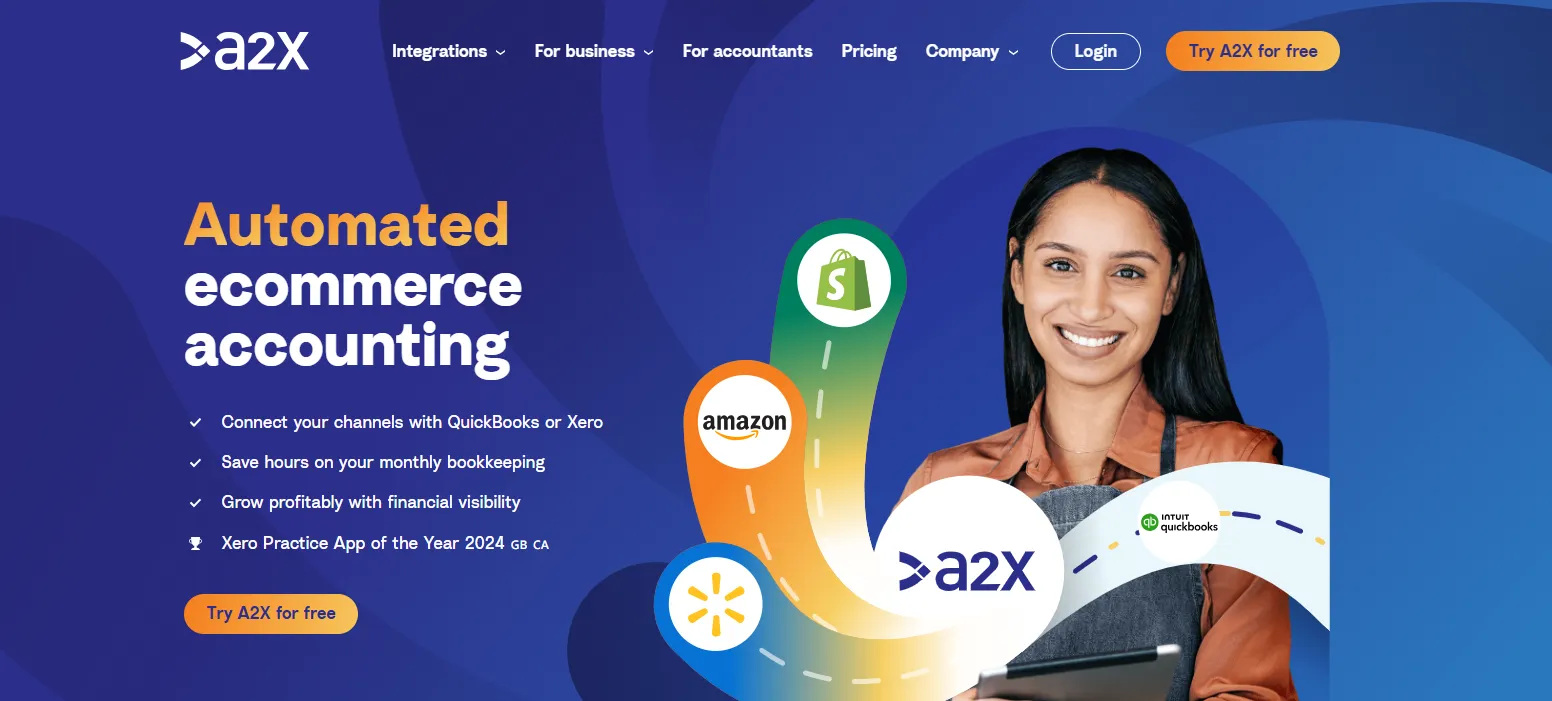
A2X is one of the most established e-commerce accounting integration tools, built to automate the flow of marketplace data into accounting platforms. It was originally founded in New Zealand and has become a standard choice for many Amazon and Shopify sellers.
What A2X does well
- Accurate payout summaries: A2X takes the raw data from Amazon, Shopify, eBay, Etsy, Walmart, and BigCommerce, then summarizes sales, refunds, fees, and taxes into invoices or journals that match your actual bank deposits in Xero or QuickBooks. This makes reconciliation much faster and reduces errors.
- NetSuite integration for enterprises: Beyond Xero and QuickBooks, A2X also connects with NetSuite, giving high-volume sellers and enterprise users an ERP-level option.
- COGS and profit tracking: By uploading SKU cost data, A2X can generate Cost of Goods Sold (COGS) entries, helping sellers track gross profit margins. Shopify users can also use “Cost Sync” to pull SKU costs automatically, and A2X integrates with tools like Settle to capture landed costs such as duties and freight.
- Multi-channel support: Sellers can connect several major marketplaces, with A2X offering specialized “Multi” plans to consolidate multiple integrations under one account.
Where sellers face challenges
- Pricing per channel: A2X charges per marketplace integration. For example, connecting Amazon and Shopify means paying for both. Multi-channel plans exist, but costs rise as you add channels or increase transaction volumes.
- Complex setup and mapping: Users must map transaction types to their chart of accounts and configure tax codes manually. Many reviewers describe the setup process as “tricky” or “time-consuming” without support.
- European VAT limitations: While A2X supports tax mapping, it does not automatically apply UK/EU VAT or OSS rules. Sellers often need to make manual adjustments or involve their accountant.
- NetSuite limitations: A2X integrates with NetSuite, but its support articles note that some features available in Xero/QuickBooks don’t fully carry over to NetSuite.
- Scaling and transaction history: Higher tiers are required to unlock longer transaction history and larger order volumes, which increases costs for growing sellers.
- Support and onboarding: A2X provides onboarding support, including one-to-one calls on some plans. Many users highlight this as extremely helpful, but reviews also note that setup can be complex and may take time without direct guidance. Premium onboarding is included with higher-tier packages such as NetSuite.
Link My Books at a glance
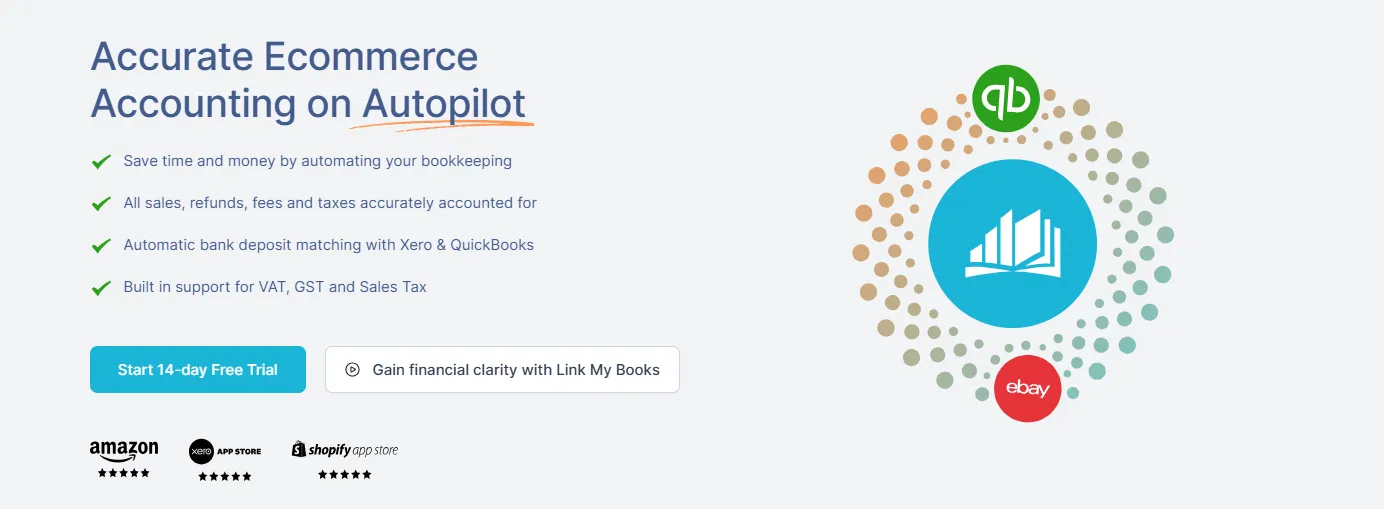
Link My Books is a UK-based e-commerce accounting automation tool that connects major sales channels directly to Xero and QuickBooks Online. It creates summarized invoices that break down sales, refunds, fees, and taxes, which align perfectly with marketplace payouts and bank deposits.
What Link My Books does well
- VAT and tax automation: Link My Books applies the correct VAT, OSS, GST, or sales tax treatment automatically, based on customer location and marketplace rules. This helps sellers stay compliant and avoid overpaying.
- Multi-channel in one plan: Link My Books pricing is based on order volume, not per channel. That means sellers can connect Amazon, eBay, Shopify, Etsy, TikTok Shop, Walmart, Square, and WooCommerce under a single subscription.
- Guided setup: A step-by-step wizard walks users through mapping accounts and taxes. Once connected, most users only need to review a few clicks each week.
- Highly rated support: Reviews consistently highlight fast, knowledgeable support, often provided by accountants. On its own site, Link My Books shares examples of support responses arriving “within half an hour” even outside standard hours.
Where sellers face challenges
- Learning curve for non-accountants: Some users say the tax mapping step can be confusing if you don’t have any bookkeeping experience, though many accountants find the process straightforward.
- Historical data limitations: Importing older data is limited by plan tier, and full backdated imports are not always available.
Link My Books is especially well-suited to UK and EU sellers that need VAT compliance and cost-effective automation across multiple sales channels. Its order-based pricing and accountant-backed support make it attractive for small and mid-sized businesses that want simplicity without the per-channel cost of tools like A2X.
What integrations do A2X and Link My Books offer, and why it matters
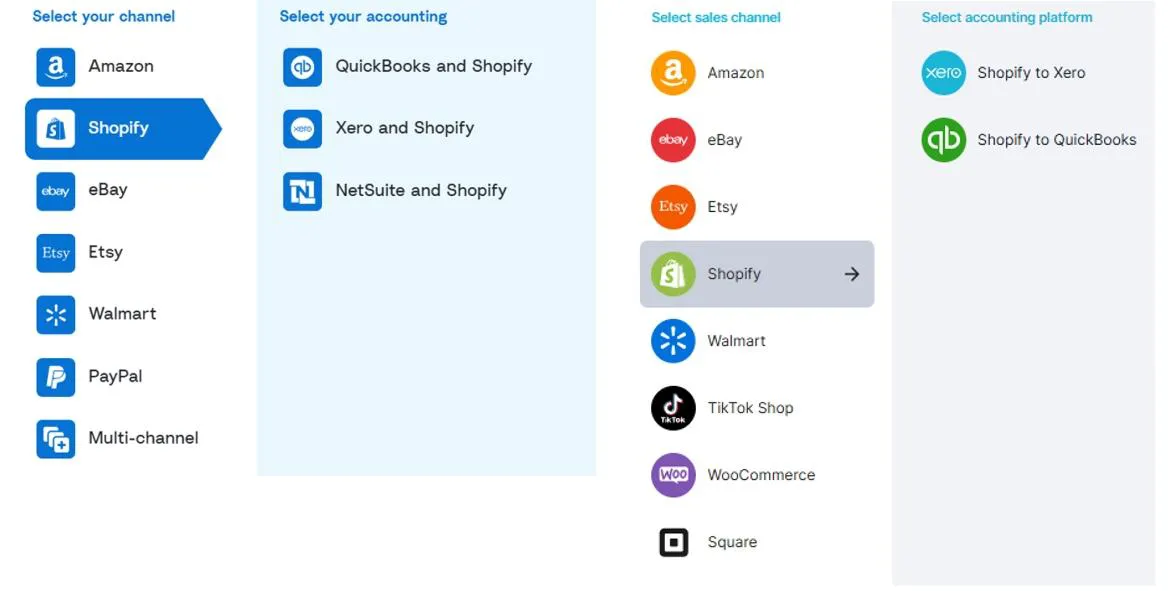
Integrations are the backbone of any e-commerce accounting tool: they define how many sales channels, marketplaces, and accounting systems you can connect, how data flows, and how smoothly everything works. Below is a detailed look at what A2X and Link My Books support today. plus where gaps or trade-offs arise.
A2X integrations - Breadth plus ERP support
Channels / Marketplaces
- A2X’s official integrations page states that it supports Amazon, Shopify, eBay, Etsy, Walmart, and PayPal (including their use as payment gateways) as core connections.
- A2X also offers a “Multi-channel” integration option so you can consolidate multiple marketplaces under one integration with your accounting system.
Accounting / ERP systems
- QuickBooks Online and Xero are primary endpoints for A2X.
- A2X offers direct integration to NetSuite for larger businesses, allowing summarized journal entries to flow into the ERP environment.
- Sage is also listed as compatible within A2X’s broader “integrations” messaging.
Special features / Edge support
- Payment gateways: A2X can detect and handle third-party payment gateways (like PayPal or Stripe used within Shopify) by posting them through clearing accounts.
- Historical data / catch-up imports: A2X allows retrieving past data from channels (within limits) to help you catch up bookkeeping.
- Currency & cross-border handling: A2X imports data in the channel’s native currency. If conversion is needed (e.g. multiple currencies), A2X handles that in export or via clearing accounts, especially when used with NetSuite.
Caveats / Constraints
- Some features available for Xero/QuickBooks do not fully translate into the NetSuite connector - meaning “feature parity” is limited.
- Not all digital sales channels (e.g. TikTok Shop, Square, WooCommerce) are natively supported - A2X’s focus remains on major marketplaces and traditional stores.
Link My Books integrations - Targeted depth for modern sellers
Channels / Marketplaces
- Amazon: The Amazon Seller Central app page shows that Link My Books imports settlements into Xero automatically.
- Shopify: On the Shopify App Store, it advertises that it handles “sales, refunds, fees and VAT/GST/sales tax” automations when connecting Shopify to Xero or QuickBooks.
- Other marketplaces: According to Capterra and software listings, Link My Books supports Amazon, eBay, Shopify, Etsy, TikTok Shop, Walmart, Square, and WooCommerce.
- Link My Books offers modules specifically for EU VAT / OSS rules and U.S. sales tax handling - meaning deeper logic is applied per marketplace and region.
Accounting systems
- Xero: The Xero App Store entry shows it automates e-commerce bookkeeping for Amazon, eBay, Shopify, etc.
- QuickBooks Online: Listed on the Intuit App Store, Link My Books ensures that your settlements match your bank deposits for seamless reconciliation.
Support features / Enhancements
- The integration is built with VAT / tax logic baked in (for UK/EU sellers) - not just raw data mapping. Link My Boojks categorizes EU/OSS rules, dispatch rules, and tax classification automatically.
- Our platform is purpose-built for modern multi-channel sellers (including nontraditional channels like TikTok Shop).
Constraints
- Link My Books does not connect to NetSuite or offer ERP integrations.
- Some plan tiers limit historical data imports (i.e. full backfeed) depending on subscription level.
Strategic implications: What These Integration Differences Mean for You
Knowing what each tool supports affects cost, setup complexity, long-term flexibility, and how much manual work remains. Here’s how to interpret these integration differences:
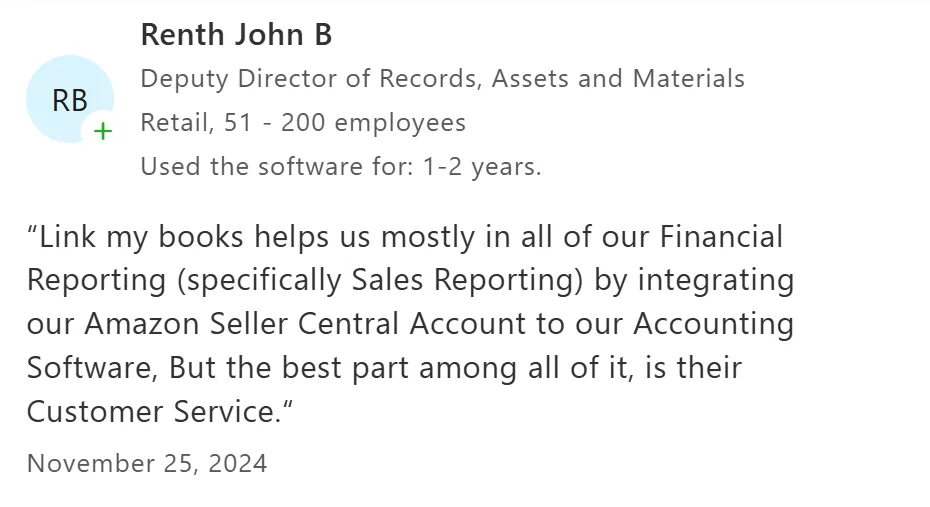
A2X vs Link My Books: A Detailed Comparison
When sellers compare A2X and Link My Books, the question isn’t whether these tools work - both reliably automate the flow of e-commerce sales data into accounting software. The real difference lies in pricing structure, tax handling, ease of use, and support quality.
Here’s a side-by-side look:
Link My Books: Modern dynamic pricing

Order-based pricing. One plan covers all connected channels
- Link My Books emphasizes a scaling pricing model that charges based on your monthly cumulative order count across all channels, rather than per channel.
- Your order-volume tiers (200, 1k, 5k, 10k, etc.) are reference points - not separate channel plans.
- Entry pricing begins at $17/month (or equivalent), depending on volume.
- Unlimited marketplaces and seller accounts are supported under this dynamic model.
You can try out our interactive pricing tool and see where you land:
[cms-pricing-tool]
✅Sellers can add new sales channels without a discrete “channel fee” increase. Cost grows with volume only.
A2X: Tiered + per-channel pricing, with multi-channel add-ons
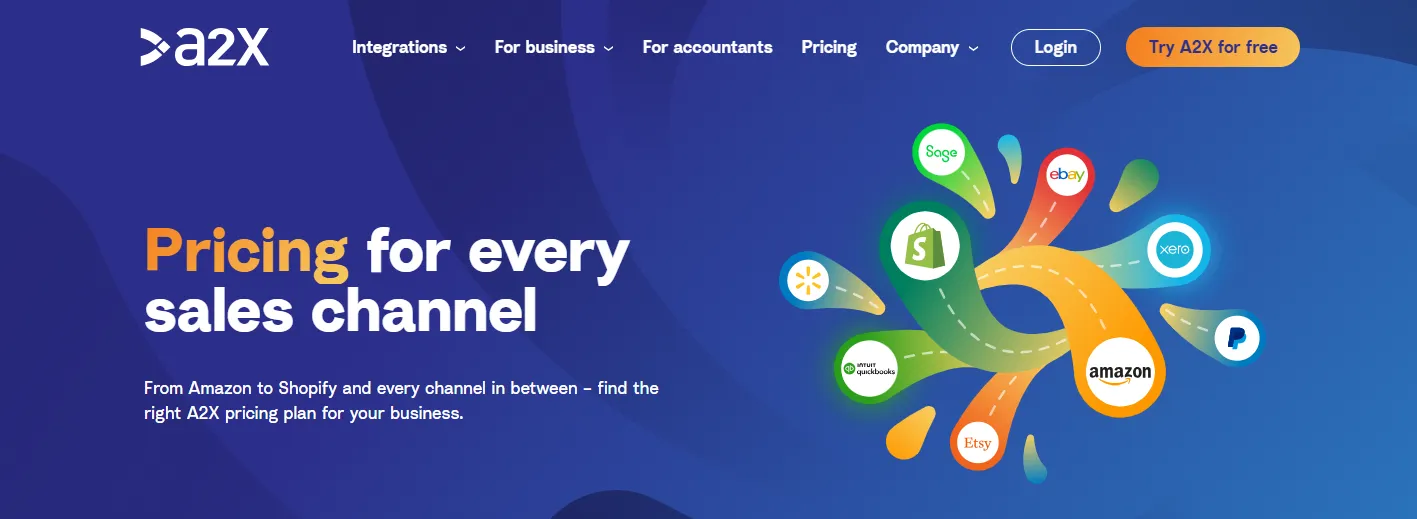
Per-channel pricing. One plan per marketplace. Multi-channel bundles exist, but cost scales rapidly with channels and order volumes.
- Amazon integration starts at $29/month for low-volume users (Mini tier).
- Higher tiers cover more orders: e.g. Standard ($79 for up to 5,000 orders), Standard 10K ( $159 ), Premium 15k, etc.
- Multi-channel plans allow combining multiple marketplaces under one umbrella plan. E.g. Multi 1K costs $89/month (for up to 1,000 orders across two channels).
- As order volume increases, so does the cost dramatically. They clearly highlight how moving from 5,000 to 10,000 orders can more than double pricing.
❗Every additional marketplace or rising order volume may require upgrading tiers or paying for a multi-channel package.
Side-by-side illustrative examples
Let’s compare real updated examples using the new data:
VAT and tax compliance
- A2X: Users must map tax codes manually in Xero/QBO. No automatic OSS or VAT separation.
- Link My Books: Built specifically for VAT/OSS rules. It auto-applies correct VAT rates based on customer location, separates marketplace-collected tax (e.g. eBay MOSS, Amazon Marketplace Facilitator rules), and ensures you don’t double-report.
This is where Link My Books crushes A2X for UK/EU sellers.
- VAT misclassification is the #1 cause of overpayment and HMRC penalties. LMB users avoid this because the system handles it at source.
- Accountants working with EU sellers often recommend Link My Books precisely because A2X leaves too much manual room for error.
- U.S. sellers care less about VAT, but even then, LMB cleanly separates marketplace-collected sales tax, which simplifies reporting.
COGS and profit tracking
- A2X: Upload SKU costs manually; can integrate with Shopify “Cost Sync” or landed cost tools like Settle.
- Link My Books: Supports COGS entries but focuses more on reconciled profitability and benchmarking.
💡A2X has slightly more complex COGS features, especially if you want freight, duties, and tariffs pulled into landed cost accounting. This makes sense for 7- and 8-figure sellers with global supply chains.
For SMBs, detailed landed cost accounting is often handled in inventory software, not bookkeeping. Link My Books is perfect while keeping complexity low.
Setup and onboarding
- A2X: Setup involves manual mapping of accounts and tax codes. Reviews consistently describe it as “tricky” or “time-consuming” without accountant involvement. Once set, it runs smoothly.
- Link My Books: A guided wizard walks you through mapping step by step. Many reviews highlight being “up and running in 15 minutes.”
💡Setup pain is not a small issue. Sellers often switch to automation tools because they’re already overwhelmed. A2X sometimes replaces one complexity with another during onboarding.
Link My Books designed its UX for non-accountants - this is why it converts so well with smaller sellers and sole traders.
Support
- A2X: Offers standard support via chat/email. Premium onboarding sessions are available but tied to higher-tier (e.g. NetSuite) customers.
- Link My Books: Entire support team are qualified accountants. Users often report fast responses within the hour, even outside business hours.
💡Support isn’t just about speed - it’s about who answers your question. With A2X, you’re talking to software support. With LMB, you’re often talking to an accountant who understands VAT and reconciliation.
For SMBs and accountants with multiple clients, this makes LMB’s support functionally an extension of their finance team.
Analytics and extras
- A2X: Focuses on accurate reconciliation. No extras beyond COGS.
- Link My Books: Provides benchmarking and financial insights - showing how your margins compare to industry peers.
💡For accountants managing multiple e-commerce clients, benchmarking is a killer feature. It turns LMB from “a tool that saves time” into “a tool that helps advise clients.” A2X is more utilitarian. You get clean books, but no broader intelligence.
A2X or Link My Books: Which should you choose?

Both A2X and Link My Books solve the same pain point: turning messy payout data into clean, reconciled accounting entries. The right choice depends on your size, markets, and priorities.
Here’s how they stack up after our detailed evaluation:
Overall Score:
- Link My Books: 4.7/5
- A2X: 4.2/5
▶️ Choose A2X if: you’re a high-volume seller already on NetSuite, or you require landed cost COGS detail at ERP level. It’s built for enterprises, not beginners.
▶️ Choose Link My Books if: you’re a small to mid-size seller (or accountant managing them), especially in the UK/EU. Its VAT automation, pricing, and accountant-backed support save real money and time every month.

💡For 80–90% of e-commerce sellers, Link My Books delivers more value at a lower cost. A2X remains the right call for ERP-heavy enterprises, but for everyone else, it’s paying more for complexity you don’t need.
And you can try it out for free!
Frequently Asked Questions
Does A2X or Link My Books support NetSuite?
A2X integrates with NetSuite as well as Xero and QuickBooks, which makes it a good fit for enterprise sellers running ERP systems. Link My Books focuses on Xero and QuickBooks, making it better suited to SMBs.
Which tool is better for VAT compliance?
Link My Books was designed with VAT and OSS automation for UK/EU sellers. It applies VAT treatment automatically and separates marketplace-collected tax (like Amazon MOSS and eBay Managed Payments). A2X requires manual tax mapping in Xero or QuickBooks.
Learn more in our dedicated Amazon VAT guide.
Can both tools handle Cost of Goods Sold (COGS)?
Yes. Both tools allow you to upload SKU cost data for COGS entries. A2X also connects with landed cost tools like Settle, which is useful for import-heavy businesses. Link My Books keeps it simple, which is often enough for SMB sellers.
For more, see our breakdown of A2X for Amazon accounting.
How do the pricing models differ?
Link My Books uses dynamic pricing based on your total monthly orders across all connected channels. You can add Amazon, eBay, Shopify, Etsy, TikTok Shop, and more under one plan without extra cost.
A2X pricing is per channel, which means costs rise with each additional marketplace. You can compare in detail here: A2X pricing.
Which integrations does each tool support?
- A2X: Amazon, Shopify, eBay, Etsy, Walmart, BigCommerce, NetSuite, Xero, QuickBooks.
- Link My Books: Amazon, Shopify, eBay, Etsy, Walmart, TikTok Shop, Square, WooCommerce, Xero, QuickBooks.
If you’re weighing options beyond A2X, check out our full guide to A2X alternatives.
Which is easier to set up?
Link My Books has a guided setup wizard that makes onboarding fast — many sellers report being live in 15 minutes. A2X setup is more manual and often described as “tricky,” especially for tax mapping. Both tools run reliably once configured. See how Link My Books simplifies onboarding in our success stories.
Who provides better support?
Link My Books’ support team consists of qualified accountants, praised for fast, detailed responses. A2X’s support is solid, but advanced onboarding (like one-to-one sessions) is reserved for higher-tier plans. If support is a key decision factor, see our comparison of A2X vs Link My Books.
Streamline your e-commerce accounting with Link My Books
Managing sales, refunds, fees, and taxes across multiple platforms doesn’t have to eat up hours every month. Both A2X and Link My Books will automate reconciliation into Xero or QuickBooks - but if you’re running a growing small to mid-size e-commerce business, Link My Books gives you the VAT accuracy, multi-channel coverage, and pricing flexibility you need without the enterprise overhead.
With dynamic order-based pricing, unlimited channels under one plan, and support from qualified accountants, Link My Books is built for sellers who want to scale confidently while keeping bookkeeping stress-free.
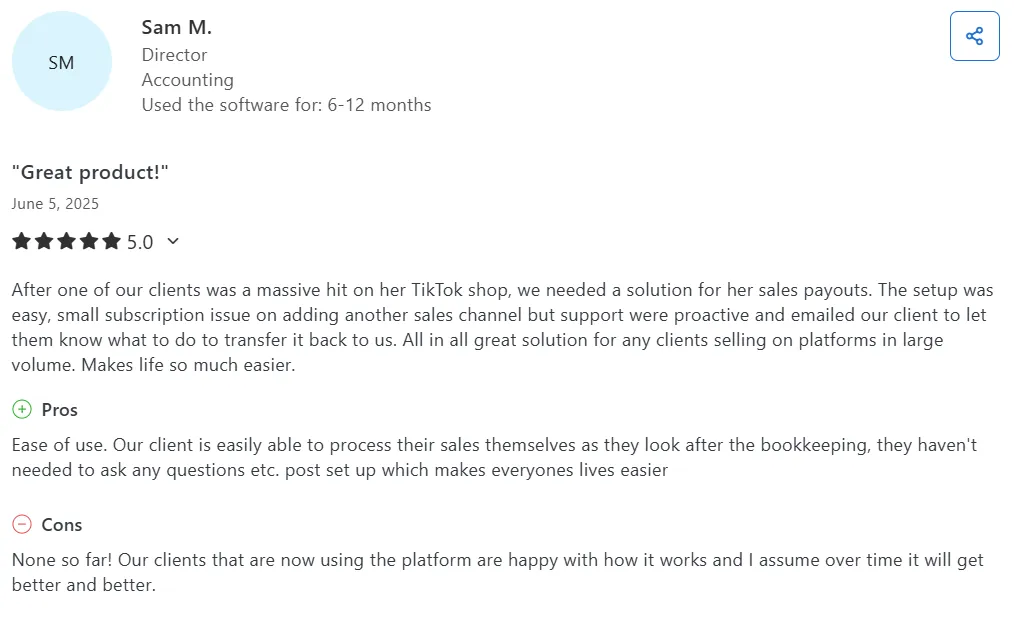
👉 Start your free 14-day trial of Link My Books and see how much time, money, and hassle you can save.



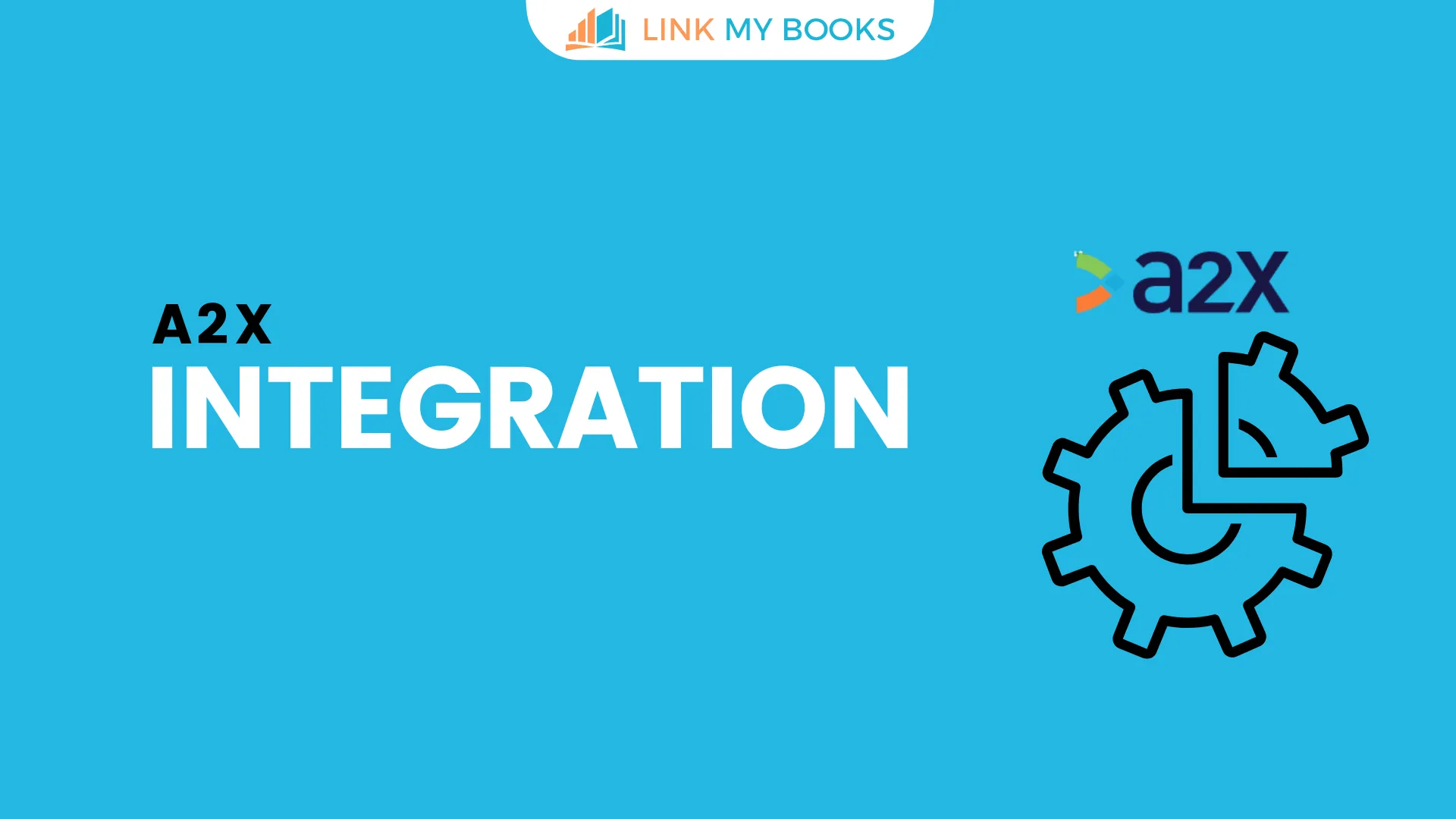










.webp)




.png)